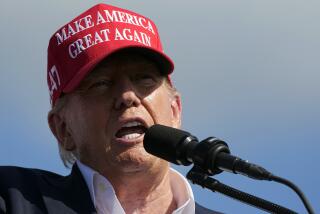Clinton Lawyers Urge Privacy for Notes
- Share via
WASHINGTON — Setting the stage for a potentially far-reaching ruling both on the status of government lawyers and the outcome of the Whitewater investigation, two former White House attorneys urged the Supreme Court on Monday to preserve the secrecy of their notes of private conversations with First Lady Hillary Rodham Clinton.
Independent counsel Kenneth W. Starr is investigating whether the first lady has obstructed his inquiry into possible fraud involving Arkansas real estate, and specifically whether she conspired to conceal her role in the questionable financial dealings.
Late in the day, Mrs. Clinton filed a separate brief, urging the high court to hear the appeal. A “person with official responsibilities [who] is under partisan attack” should be allowed to consult White House attorneys in confidence, she argued.
Last June, in an unusual move, Starr claimed access to “all documents created during meetings attended by any attorney” from the White House counsel’s office.
He was particularly interested in notes taken during two meetings. On July 11, 1995, White House lawyers Jane Sherburne and Miriam Nemetz, along with David Kendall, the Clintons’ private attorney, met with the first lady to discuss her upcoming interview with Starr about events after the suicide of White House counsel Vincent Foster. It has been alleged that Whitewater files were taken from Foster’s office.
The second set of notes at issue was taken by Sherburne on January 26, 1996, after the first lady appeared before a grand jury here. Mrs. Clinton was called to answer questions after records of her law firm were found belatedly in the White House residence quarters.
Sherburne and Nemetz refused to comply with Starr’s subpoena, contending that their notes are protected by the traditional attorney-client privilege as well as the lawyer’s “work product” privilege.
The Supreme Court has described the attorney-client privilege as one of the oldest and best established principles in law. Client and lawyer must be permitted to talk in confidence to protect the rights of the client and the lawyer’s ability to do the job.
The privilege is also written into the federal rules of evidence. Rule 503 says that “a client has a privilege to refuse to disclose and to prevent any other person from disclosing confidential communications [involving] professional legal services.”
Based on this rule, a federal judge in Little Rock, Ark., refused Starr’s request. Last month, however, the U.S. court of appeals in St. Louis on a 2-1 vote upheld Starr’s subpoena and ruled that government lawyers are not covered by the privilege.
Judge Pasco M. Bowman agreed that the attorney-client privilege may be “the best established of the common-law principles” but said that does “not necessarily mean that it must apply in this dispute within the federal government.” While private lawyers must represent their client, government lawyers must represent “the strong public interest in honest government and exposing wrongdoing by public officials,” he said.
Monday’s appeal filed on behalf of Sherburne and Nemetz calls this “an extraordinary and unprecedented decision that will substantially impair” the ability of the White House lawyers to advise the president and his top aides.
If the ruling is allowed to stand, it will clear the way for grand juries or congressional committees to force White House lawyers to testify about their private conversations with the president.
Usually, the Justice Department appeals all cases involving the federal government or the United States. But the department pointed out that the independent counsel is technically its appointee, which suggests a conflict of interest.
As a result, private lawyers from the firm Mayer, Brown & Pratt were hired to file the appeal in the case (Office of the President vs. Office of Independent Counsel, 96-1783).
Starr’s office said that he will urge the Supreme Court to act on the appeal before recessing in July. If the justices agree to hear the case, it likely will be argued in the fall.
More to Read
Sign up for Essential California
The most important California stories and recommendations in your inbox every morning.
You may occasionally receive promotional content from the Los Angeles Times.











